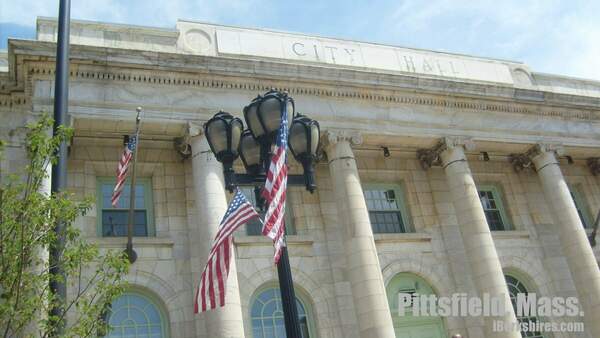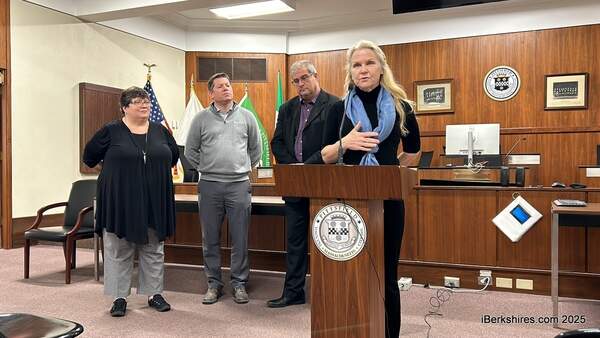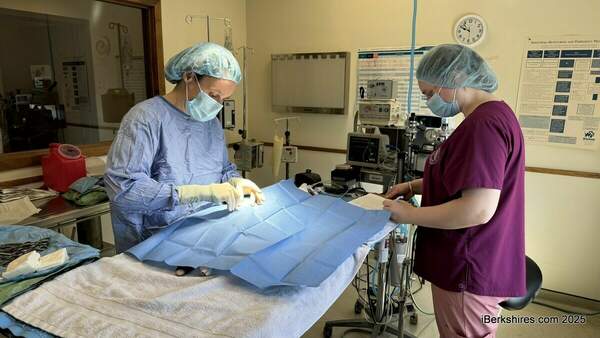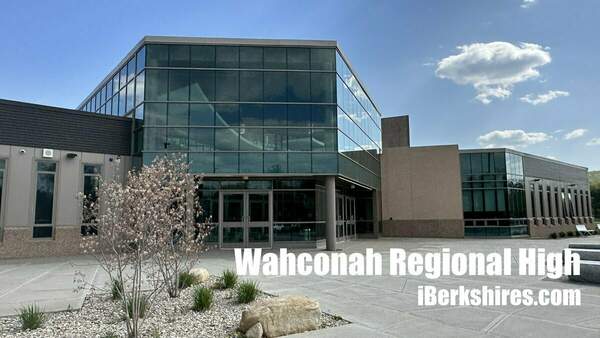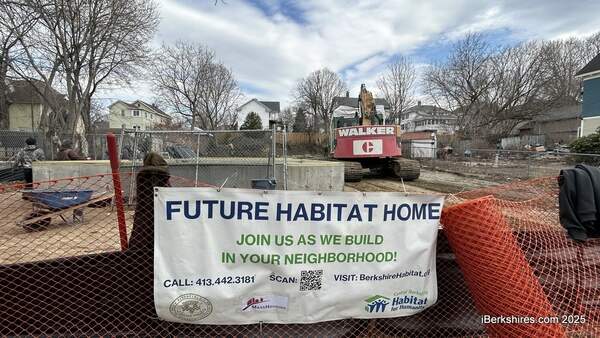Pittsfield Council Looks At Bonding Impacts For New Taconic
 Cinder McNerney from First Southwest Financial, presented models of tax impacts of the new project. Cinder McNerney from First Southwest Financial, presented models of tax impacts of the new project. |
PITTSFIELD, Mass. — Should the proposed Taconic High School be approved, city officials will have to make some long-term financial decisions.
They could bond quickly to take advantage of lower interest rates and start paying principal earlier or push back the debt.
The city will also have to decide whether to bond for 20 years to save on the total amount of interest paid or 28 years to lower the annual payments.
Cinder McNerney, managing director of First Southwest, has seen cities and town employ the whole spectrum of options and said there are benefits to each.
The bonding isn't expected for about two years, so she told the City Council that if it does approve the $120.8 million authorization to fund the project, it should keep the options open.
"You wouldn't want to constrain your vote to a term no longer than 20 years. I think you want the flexibility to do whatever you want to do when you go to sell the debt," she told the City Council on Tuesday.
The city is anticipated to borrow $45 million for the project, which according to Director of Finance Sue Carmel is 37 percent of the total project. The state is expected to kick in the rest based on an 80 percent reimbursement rate on eligible project costs.
McNerney presented a spreadsheet of cost estimates based on 4, 4.25 and 4.5 percent interest rates for 20,25 and 28 years, respectively. The annual payments the city is required to make range from $2,648,910 to $3,311,120, creating tax rate increases of anywhere from 3.89 to 4.50 percent.
In the 28-year model, it is estimated that the city will make $2,858,328 in annual payments. That is expected to cost residential taxpayers about $70 more per $100,000 of assessed property each year and commercial owners about $356 more per $250,000 of assessed value.
The 25-year model calls for payments of $2,957,097 with residents seeing increases of about $72 more per year per $100,000 and commercial owners $368 more per $250,000.The 20-year model calls for $3,311,120 in payments resulting in residential owners seeing about $81 per year per $100,000 and commercial owners paying $412 more per $250,000.
The average home is assessed at $174,000. The group also modeled the impacts of a renovation project in which the city would bond $36 million.
"Clearly, the longer you go even though you are paying lower payments, you are paying more overall," said Ward 5 Councilor Jonathan Lothrop, who advocated for lower terms to avoid paying more in interest.
McNerney says the actual bonding can play out in many ways and the models presented was more of a starting point.
"There are ways to manage this in terms of the use short-term notes and then bonds and ways to manage it so it wraps around existing debt," she said.
"The balancing act is whether or not you want to try and take advantage of rates and get in the market sooner, if you want to do it piecemeal, and whether or not you want to defer the impact as far as possible into the future but you risk interest rates going up between now and then."
 The City Council held a special meeting on Tuesday about the bonding. The City Council held a special meeting on Tuesday about the bonding. |
The city will have to start making payments on the principal of a bond after it is issued, so short-term borrowing is an option during the construction to provide the cash flow. McNerney said the city could possibly push back the bonding itself until as late as 2020 by managing the cash flow in conjunction with the reimbursement from the MSBA but interest rates are expected to increase by then.
"Every dollar you spend, you will get back 75 cents within a month or two once the project is rolling with the MSBA," she said of the construction timeframe, when most of the spending will be needed.
According to consultant Dale Caldwell, some $97 million will need to be spread out over the two years of construction.
The models were also based on interest rates higher than are typically issued at this point, building in what Lothrop called a "buffer" for increased in the next two years. Currently the rates are about a percentage point lower than estimated, McNerney said.
"Rates have been favorable for the last 10 years and are still favorable," she said.
Looking at the annual bill in the $2 million to $3 million range, Ward 6 Councilor John Krol again reiterated that the educational program calls for up to 100 students from out of the district, all bringing with them $17,000 each or so in revenues to the school, which nearly offsets the annual payments.
"The choice to do nothing is absolutely not a choice," he said of the condition of the school and added that just a small renovation wouldn't attract those 100 students and revenue.
Superintendent Jason McCandless said that while the school isn't governed by a regional body, it will serve that purpose by attracting vocational students from throughout the county. Currently, Dalton is the primary sender of vocational students but there are even more from Dalton going to Smith Vocational. McCandless says Taconic will prove to be a better deal for those students. He said the same for Lanesborough.
McCandless believes students from South County will make the biggest impact.
"South County is quite underserved in terms of vocational offerings and we are the option for them," he said.
The City Council will be asked on April 14 to authorize borrowing of $120.8 million — the total cost of the project — minus what the state ultimately ends up reimbursing.
Taconic High School Project Tax Impact Estimates by iBerkshires.com
Tags: bonding, school project, Taconic High,
 Cinder McNerney from First Southwest Financial, presented models of tax impacts of the new project.
Cinder McNerney from First Southwest Financial, presented models of tax impacts of the new project. The City Council held a special meeting on Tuesday about the bonding.
The City Council held a special meeting on Tuesday about the bonding.
